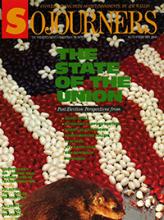South Africa is once again a focus of the world's attention. As 1988 came to a close, ominous signs of racist regression added an incendiary element to an already explosive political situation.
A resurgent Conservative Party composed of right-wing whites is determined to enforce strict apartheid laws at the municipal level. These laws are comprehensive. They call for the total separation of races in all public places and facilities.
The Conservative Party gained control of 60 of the 95 municipal councils in Transvaal Province in October's segregated, nationwide municipal elections. The Conservatives have wasted no time in taking steps toward making sure that South Africa's future remains in the past. Already, the city councils in the towns of Boksburg, Brakpan, and Carletonville have voted to put back in place "whites only" signs in public areas. Carletonville went even further and voted to consider putting a curfew on blacks in white neighborhoods.
One of the most controversial initiatives undertaken by some of these town councils is the closing down of black businesses in white districts. Blacks in surrounding townships in the Transvaal are staging a boycott of white stores in retaliation. White business leaders, feeling the financial pinch, have asked the councils to reconsider, saying that local economies are being irreparably damaged because of the loss of business. To date, the council members are remaining defiant.
Read the Full Article

